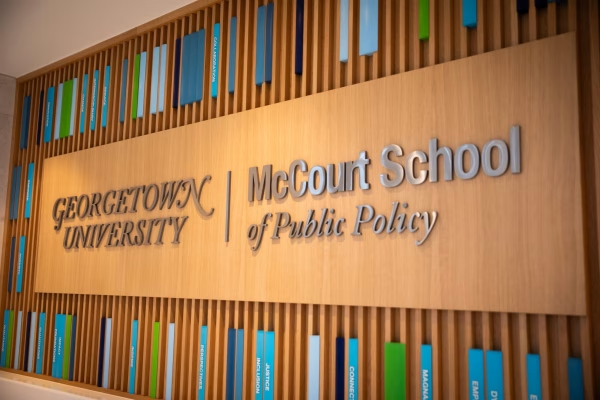Georgetown University’s McCourt School of Public Policy hosted the final round of its annual Public Policy Challenge, which gathers graduate students to pitch innovative solutions to Washington, D.C.’s pressing issues, on April 11.
Applicants for the challenge included students from across all of Georgetown’s graduate schools who submitted policy proposals for review by Georgetown faculty, previous winners and leaders in the D.C. area. This year, five finalists were selected April 1 from over 50 applications who then revised and workshoped their projects and presented the finalized versions on Friday, April 11.
Jaclyn Clevenger, the director of student engagement at McCourt who leads the challenge, said it inspires students to find solutions to difficult problems.
“The Policy Challenge asks students to take the valuable lessons they have learned inside the classroom and apply them to addressing real-world issues,” Clevenger wrote to The Hoya. “They have to ask hard questions when evaluating those issues and utilize a human-centered design approach when developing their solutions.”
Nina Bachich (GRD ’26), who worked on the finalist proposal “A.C.C.E.S.S. D.C.” to design emergency preparedness plans for individuals with disabilities in D.C. schools, said programs like the Policy Challenge make Georgetown stand out.

“This is one of the things that makes Georgetown what it is,” Bachich told the Hoya. “So why not put ourselves out there and try our best to see if we have what it takes to be able to create policies that impact people? It’s not just another fun extracurricular activity that we have available, but a great bonding experience.”
Bachich said her personal experience helped shape her team’s project to make a real impact on the D.C. community.
“I am a wheelchair user, and we had a fire alarm go off last semester,” Bachich said. “I had no idea what to do.”
“I felt like my life was not cared about in the school,” Bachich added. “Then I thought about school-aged children, and I can’t even imagine how they would feel in an emergency situation.”
Katherine Burbank (MED ’26), who worked on another finalist proposal — “Nourish to Flourish,” a virtual program that brings culinary medicine to medical students to help underserved communities — said she was inspired to join the competition because working on public policy pushed her out of her comfort zone as a medical student.
“I was inspired by last year’s winners and the fact that they were able to be successful in this space that medical students are exposed to in some ways, but don’t necessarily have as much practice in enacting policy as maybe some of the other schools do who are part of this proposal competition,” Burbank told The Hoya.
“So that, along with the idea of just being able to challenge myself and ourselves with doing something new, and seeing if it’s something that could actually be enacted in our local community is really inspiring,” Burbank added.
Abril Hunter (GRD ’25), who worked on the finalist proposal “Truancy to Opportunity” that aims to limit youth crime in D.C. by empowering students to boost school attendance, said participating in the pitch competition last year inspired her to apply again.
“As public policy students, we don’t really get a lot of chances to formulate our own ideas on public policy and take it in a creative manner whichever way you want,” Hunter told The Hoya. “So last year we were really inspired by all that we learned in our courses so we wanted to take all the knowledge we were gaining and make it more applicable.”
Finalist proposal “Empower Immigrant Parents to Improve Their Children’s Success” aims to support immigrant parents in navigating D.C. school systems. The fifth finalist, “Curbing Diabetes at the Curbside,” was created to provide free diabetes screenings to Wards 7 and 8 to help with early detection.
Clevenger said bringing this competition to Georgetown bridges the gap between what students learn in the classroom and enacting real change in the community.
“I saw firsthand how important it was for students to learn more about the communities in which they were living and the issues that impact their neighbors,” Clevenger wrote. “Washington, D.C., is such a vibrant and unique city, and my hope is that the Policy Challenge offers students an opportunity to study local policy issues and engage directly with policymakers and community leaders.”